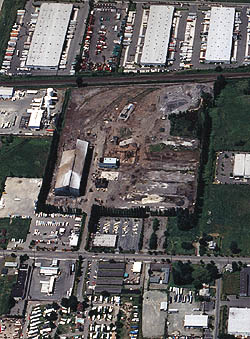Eagle lands on newly cleaned Kent site
By STEPHEN REIMERS
Floyd & Snider Inc.
Kent Central LLC's redevelopment of a 34-acre former steel manufacturing facility in Kent, is on track and will result in a site cleaned up to the satisfaction of state regulators - and a new regional distribution warehouse and corporate headquarters for Eagle Hardware.
For several decades the site supported a manufacturing facility which reprocessed steel by melting scrap obtained from old automobiles and other materials. Last operated by Salmon Bay Steel Corp., the facility was shut down in 1991 and remained inactive since that time.

|
An integrated, fast-track cleanup led to redevelopment of a former steel manufacturing facility in Kent.
Photo by Joe Floyd
|
Environmental concerns resulting from former operations at the site included significant PCB, petroleum and heavy metal contamination.
Redevelopment began in late 1996 when developers O'Keefe/Lee hired Floyd & Snider Inc., a Seattle-based consulting firm specializing in development of strategies and technical solutions for contaminated properties. Together, the developer, environmental consultant and the project general contractor, Poe Construction, developed an integrated and fast-track approach for cleaning up site contaminants and constructing a 654,000-square-foot industrial warehouse facility.
Redevelopment of idled or underused urban industrial property is often perceived to be uneconomical because of permitting issues and the difficulty in determining the cost of cleanup required by regulators. Floyd & Snider's experience indicates that "brownfield" redevelopment can be economically feasible if a strategy is developed early on which combines land use compatibility with appropriate cleanup technologies and which plans for coordination between project construction and cleanup actions.
At the Kent site, Floyd & Snider acted as the prime consultant for a team that included AGI Technologies, Earth Consultants and Pentec Environmental. Team responsibilities included assessing the site's environmental and geotechnical conditions, helping to determine the project's financial feasibility, developing site specific cleanup levels, acting as general contractor for cleanup of site contamination, and managing the State Environmental Policy Act permitting process.
Site redevelopment was fast-tracked by focusing the environmental assessment in areas of known or suspected contamination; combining assessment and contaminate removal in areas requiring cleanup; and doing cleanup in parallel with demolition activities.

|
The industrial site in Kent was very attractive for redevelopment but nothing happened until a plan was formulated that combined project construction and cleanup activities.
Photo by Aerolist Photographers.
|
Further, the scope of the cleanup action was minimized by proactively implementing Ecology's newly released policies regarding cleanup of total petroleum hydrocarbons. The site was used as a test case for the development of risk-based cleanup levels for specific petroleum products. The result was an improved scientific basis upon which to calculate the degree of cleanup required and significantly reduced cleanup costs.
Kent Central LLC acquired the site from O'Keefe/Lee as cleanup actions were being implemented. Floyd & Snider, retained by Kent Central, acted on behalf of the owner to negotiate cleanup levels and procedures with the Department of Ecology and the Attorney General's office. The resulting agreement ensures state satisfaction with final cleanup actions and development plans and provides long term liability protection for future owners of the site.
Facility construction will be substantially complete by year-end, just over two years from project inception. When complete, the 654,000-square-foot warehouse building will be one of the largest non-Boeing structures ever built in this state.
The success of combining project development with environmental cleanup will allow this formerly idle, contaminated property to once again become productive while also protecting the environment.
Perhaps the greatest benefit of this brownfield redevelopment, however, is that it made available property of a size which is generally no longer obtainable in industrial zoned areas of Kent.
Stephen Reimers P.E. is an engineer with Floyd & Snider, a Seattle-based environmental consulting firm involved in developing strategies for cleanup of contaminated properties.

Copyright © 1998 Seattle Daily Journal of Commerce.
| ![[Environmental Outlook]](logo.jpg)
![[Environmental Outlook]](logo.jpg)